Who are the 10 richest Republican senators?
The government pays all senators. They make $174,000 a year.
But many senators have more money from other places and are very rich.
Most of them worked in business before they became politicians and made a lot of money.
Senators are important people with a lot of power. They can get into good business deals and meet other important people.
This helps them make even more money by investing. The richest senators change sometimes as they gain or lose money.
Below is a list of the top 10 richest senators, but their rankings may change as their wealth goes up or down.
Kevin Hern, Rick Scott, Greg Gianforte, Paul Mitchell, Mitt Romney, Vernon Buchanan, Mike Braun, John Hoeven, Fred Upton, and Roger William.
top-10-richest_63545781Let us now explore together how they made their fortunes.

1. Kevin Hern
Representative Kevin Hern, a Republican from Oklahoma, has a net worth of $361 million.
He has served as a representative since 2018. Hern amassed his wealth through various endeavors, including banking, real estate, manufacturing, and sports.
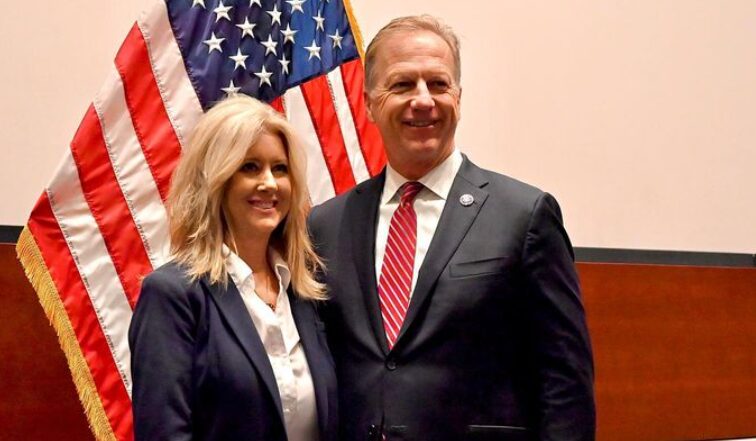
He started his career working for McDonald’s, eventually owning 18 franchises in the Tulsa metropolitan area.
Hern later expanded into politics, winning a seat in the United States House of Representatives in 2018.
He gained attention for his involvement in efforts to challenge the results of the 2020 United States presidential election.
In 2023, Hern became the chair of the Republican Study Committee in the House.
He also made bids for Speaker of the House in both January and October 2023, showcasing his influence within the Republican Party.
2. Rick Scott
Rick Scott, a Republican, boasts a net worth of $300,000,000.
Before his election to the U.S. Senate in 2018, Scott served two terms as the 45th Governor of Florida.

His wealth primarily stems from his tenure as CEO of a healthcare company named Columbia/HCA.
Despite controversies surrounding his leadership at Columbia/HCA, including fraud allegations and a substantial settlement, Scott transitioned into venture capitalism and pursued various business ventures.
He founded Conservatives for Patients’ Rights in 2009.
In 2018, Scott won the US Senate election in Florida, succeeding Democratic incumbent Bill Nelson after a closely contested race.
He assumed office in January 2019 and is seeking reelection in 2024.
3. Greg Gianforte
Greg Gianforte, a Republican, possesses a net worth of $189,300,000.
Elected as Montana’s 25th Governor in 2020, Gianforte amassed his wealth primarily through entrepreneurship in startups, notably founding RightNow Technologies, a major employer in Bozeman.

RightNow Technologies, co-founded with his wife Susan in 1997, grew into a significant player in customer relationship management software.
The company’s success culminated in a public offering in 2004 and its subsequent acquisition by Oracle Corporation for $1.5 billion in 2011.
Before his gubernatorial role, Gianforte served as the U.S. representative for Montana’s at-large congressional district from 2017 to 2021.
Despite a controversial incident involving an assault conviction in 2017, he continued his political career and secured reelection to Congress in 2018.
Transitioning from federal to state politics, Gianforte emerged victorious in the 2020 Montana gubernatorial election, becoming the first Republican governor of the state since 2005.
4. Paul Mitchell
Paul Mitchell, with a net worth of $179.6 million, was an American business executive and politician who served as the U.S. representative for Michigan’s 10th congressional district from 2017 to 2021.
He initially affiliated with the Republican Party during most of his time in Congress but later switched to becoming an independent in December 2020, shortly before leaving Congress.
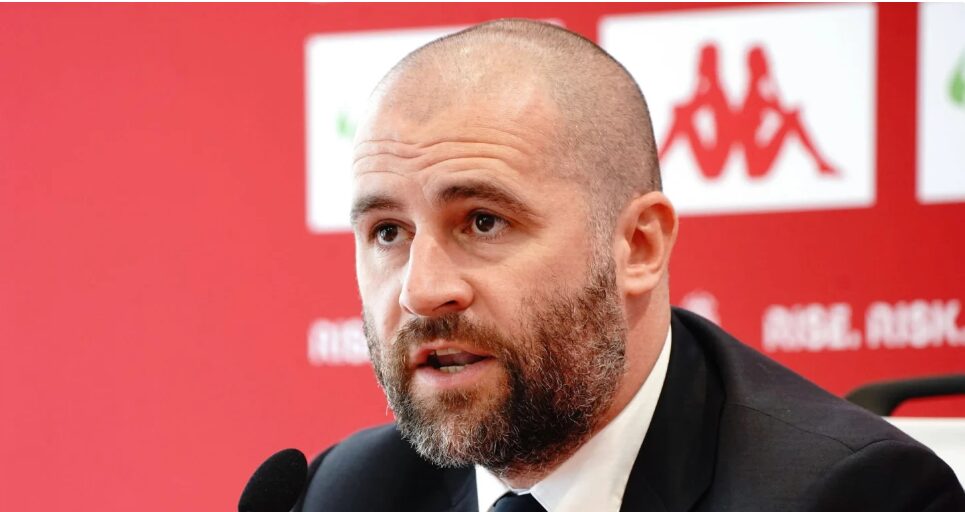
Mitchell decided not to seek re-election in 2020, citing a desire to spend more time with his family and health issues.
Born on November 14, 1956, in Boston, Massachusetts, Mitchell grew up in Waterford Township, Michigan. He graduated from Michigan State University in 1978.
Before entering politics, Mitchell owned and operated the Ross Medical Education Center.
He also chaired the Faith and Freedom Coalition of Michigan, a conservative nonprofit foundation.
Mitchell ran for various political positions, including the Michigan State Senate in 2013 and the United States House of Representatives in Michigan’s 4th congressional district in 2014, before winning the seat for Michigan’s 10th congressional district in 2016.
During his tenure in the U.S. House of Representatives, Mitchell was a member of the Republican Study Committee.
He notably voted in favor of the American Health Care Act of 2017, aimed at repealing the Affordable Care Act.
Mitchell’s decision to leave the Republican Party stemmed from disagreements with President Donald Trump’s rhetoric and actions. He criticized Trump’s statements and urged him to stop spreading baseless claims about election fraud.
Ultimately, Mitchell’s decision to leave the Republican Party highlighted his concerns about the direction of the party and its alignment with Trump’s rhetoric and actions.
5. Mitt Romney
Willard Mitt Romney, currently serving as the junior United States senator from Utah since 2019, possesses a net worth of $174.5 million.
Romney’s career earnings have been diverse and successful.
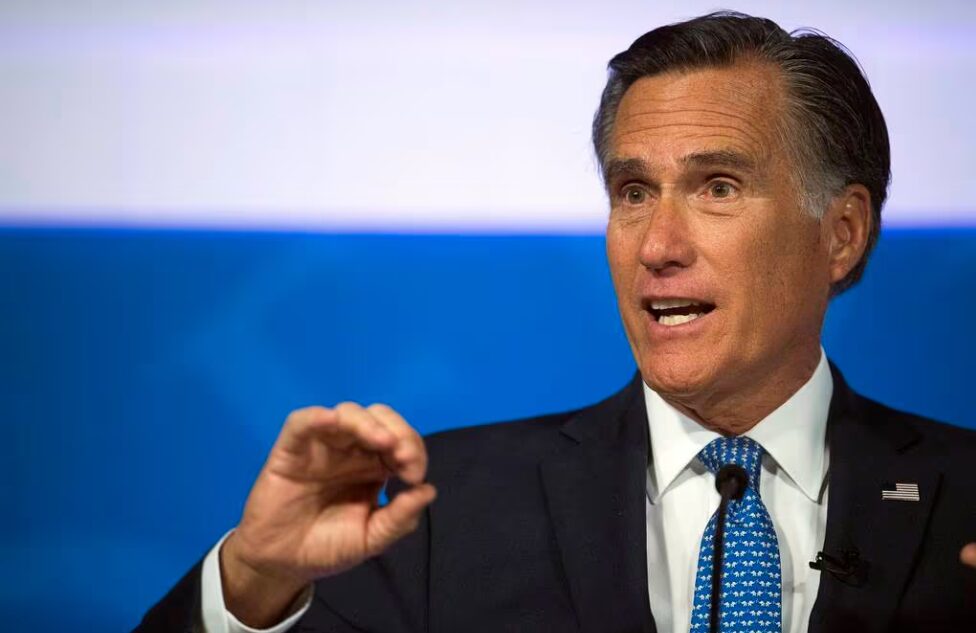
He started as a management consultant and later became the CEO of Bain & Company, a role in which he navigated the company through financial difficulties.
In 1984, Romney co-founded Bain Capital, a prominent private equity investment firm that grew into one of the nation’s largest.
Romney’s political journey includes serving as the governor of Massachusetts from 2003 to 2007, where he implemented significant reforms such as the “Romney Care” healthcare reform law.
Despite his loss in the 2012 presidential election, Romney remained influential in politics.
In 2018, he announced his candidacy for the U.S. Senate seat in Utah, which he won, becoming only the third person to be elected governor of one state and U.S. senator for another.
Throughout his Senate tenure, Romney has been viewed as a moderate Republican, often taking independent positions, such as voting to convict Donald Trump in both of his impeachment trials and supporting various social causes.
In 2023, Romney announced his retirement from the Senate, opting not to seek re-election in 2024.
6. Vernon Buchanan
Vernon Gale Buchanan, an American businessman and politician, has a net worth of $157.2 million.
Buchanan has been serving as the U.S. representative for Florida’s 16th congressional district since 2013.
He is a member of the Republican Party. He initially entered Congress in 2007, representing Florida’s 13th congressional district until redistricting.

Buchanan holds a prominent position as the sole Republican member from Florida on the House Ways and Means Committee, which oversees tax policy, international trade, health care, and Social Security.
Before his congressional career, Buchanan amassed over 30 years of experience in business.
He chaired both the Greater Sarasota Chamber of Commerce and the Florida Chamber of Commerce, besides serving on the board and executive committee of the United States Chamber of Commerce.
It is worth noting that Buchanan received over $2.3 million in forgiven PPP loans.
He currently ranks as the 6th-wealthiest member of Congress.
7. Mike Braun
Michael Kent Braun, an American businessman and politician, holds a net worth of $136.8 million.
Serving as the junior United States senator from Indiana since 2019, Braun is affiliated with the Republican Party.
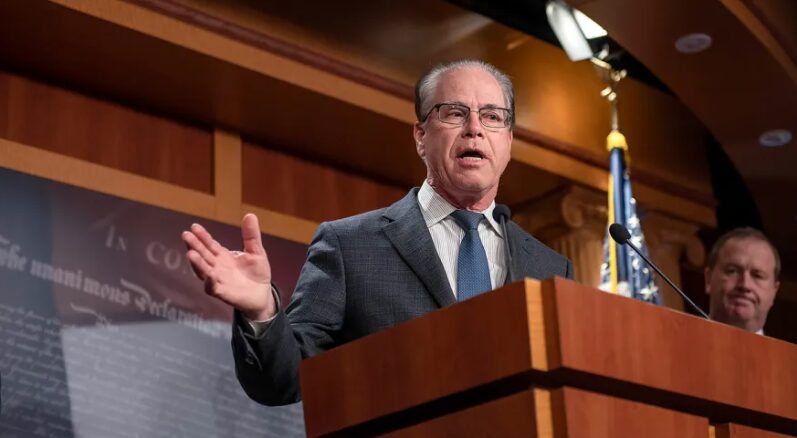
Before his Senate tenure, he represented the 63rd district in the Indiana House of Representatives from 2014 to 2017.
Braun’s political stances include opposition to the Affordable Care Act, same-sex marriage, abortion, and a pathway to citizenship for undocumented immigrants.
However, he has advocated for the Republican Party to address climate change more seriously.
Braun supported President Donald Trump’s trade and tariff policies, despite previously advocating for free trade.
He voted to acquit Trump in the impeachment trial related to the Trump-Ukraine scandal and defended Trump’s efforts to overturn the election results following Joe Biden’s victory in the 2020 presidential election.
Braun announced his candidacy for governor of Indiana in 2024, filing election papers on November 30, 2022, and officially declaring his candidacy on December 12.
8. John Hoeven
John Henry Hoeven III, an American banker and politician, holds an estimated net worth of $93.4 million.
Serving as the senior U.S. senator from North Dakota since 2011, Hoeven is a member of the Republican Party.
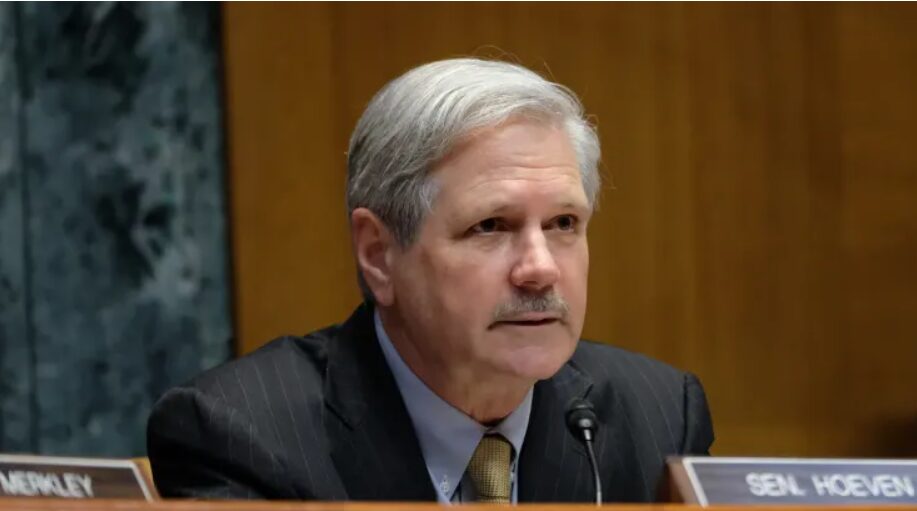
Before his Senate tenure, he served as the 31st governor of North Dakota from 2000 to 2010.
Hoeven’s career in banking included various executive roles at different banks, notably as president of the nation’s only state-owned bank, the Bank of North Dakota, from 1993 to 2000.
Currently, he serves on the board of directors at First Western Bank & Trust.
Despite his substantial wealth, Hoeven remains committed to public service, representing North Dakota’s interests in the Senate.
As one of the wealthiest U.S. senators, Hoeven holds the esteemed position of being the dean of North Dakota’s congressional delegation.
9. Fred Upton
Frederick Stephen Upton, an American politician and member of the Republican Party, boasts a net worth of $79.0 million.
He served as a U.S. representative from Michigan from 1987 to 2023, representing the state’s 6th congressional district since 1993.

Upton played a significant role in shaping post-Obamacare healthcare legislation, notably serving as the former chairman of the Committee on Energy and Commerce.
He holds the distinction of being the only person in American history to vote to impeach two presidents: Bill Clinton in 1998 and Donald Trump in 2021.
After Sander Levin’s retirement, Upton became the dean of Michigan’s congressional delegation.
Following redrawn district boundaries, Upton did not seek reelection in 2022 and retired from Congress upon the expiration of his 18th term in 2023.
10. Ronald Johnson
Ronald Harold Johnson, an American politician affiliated with the Republican Party, holds an estimated net worth of $78.5 million.
Serving as the senior United States senator from Wisconsin since 2011, Johnson won his seat by defeating Democratic incumbent Russ Feingold in 2010 and again in a rematch in 2016.

He narrowly secured reelection in 2022 by defeating Lieutenant Governor Mandela Barnes.
Originally from Mankato, Minnesota, Johnson completed his education at the University of Minnesota after attending high school in Edina, a suburb of the Twin Cities.
Before venturing into politics, he served as the chief executive officer of a polyester and plastics manufacturing company in Oshkosh, Wisconsin, which was founded by his brother-in-law.
Known for his alignment with President Donald Trump, Johnson supported various Trump administration policies, including the Tax Cuts and Jobs Act of 2017 and the decision to end Deferred Action for Childhood Arrivals (DACA).
He has also been vocal in his skepticism of climate change science.
Throughout the COVID-19 pandemic, Johnson voted for the CARES Act but resisted certain public health measures, invited witnesses to Senate hearings who promoted fringe theories about the virus, and spread misinformation about COVID-19 vaccinations through his position as chairman of the Senate Homeland Security Committee.
Take into account how the following Republicans have made their fortunes: Donald Trump, Steve Garvey, Jim Jordan, and Nikki Haley.
1 thought on “Top 10 richest Republican senators: How They Have Made their Wealth”